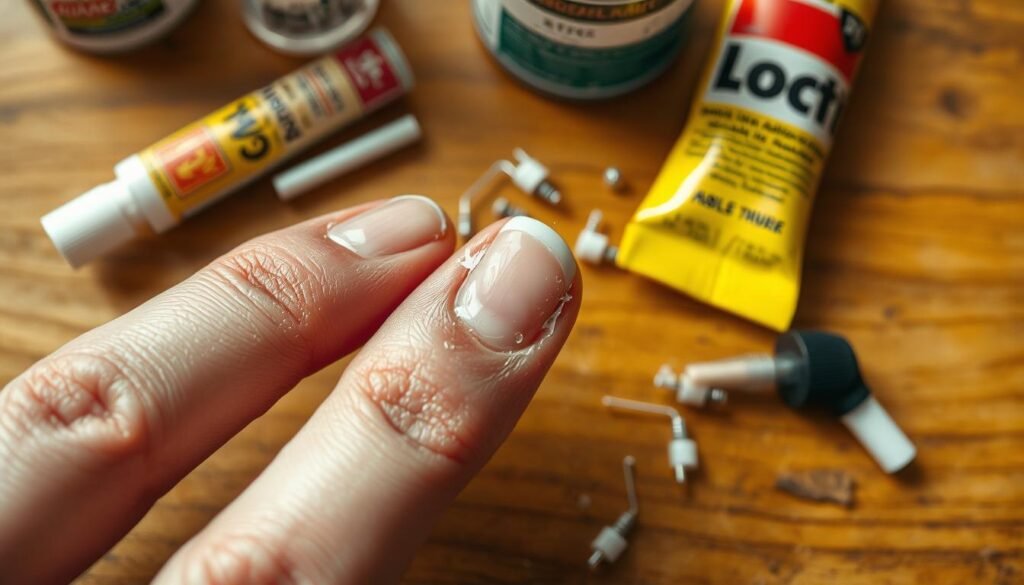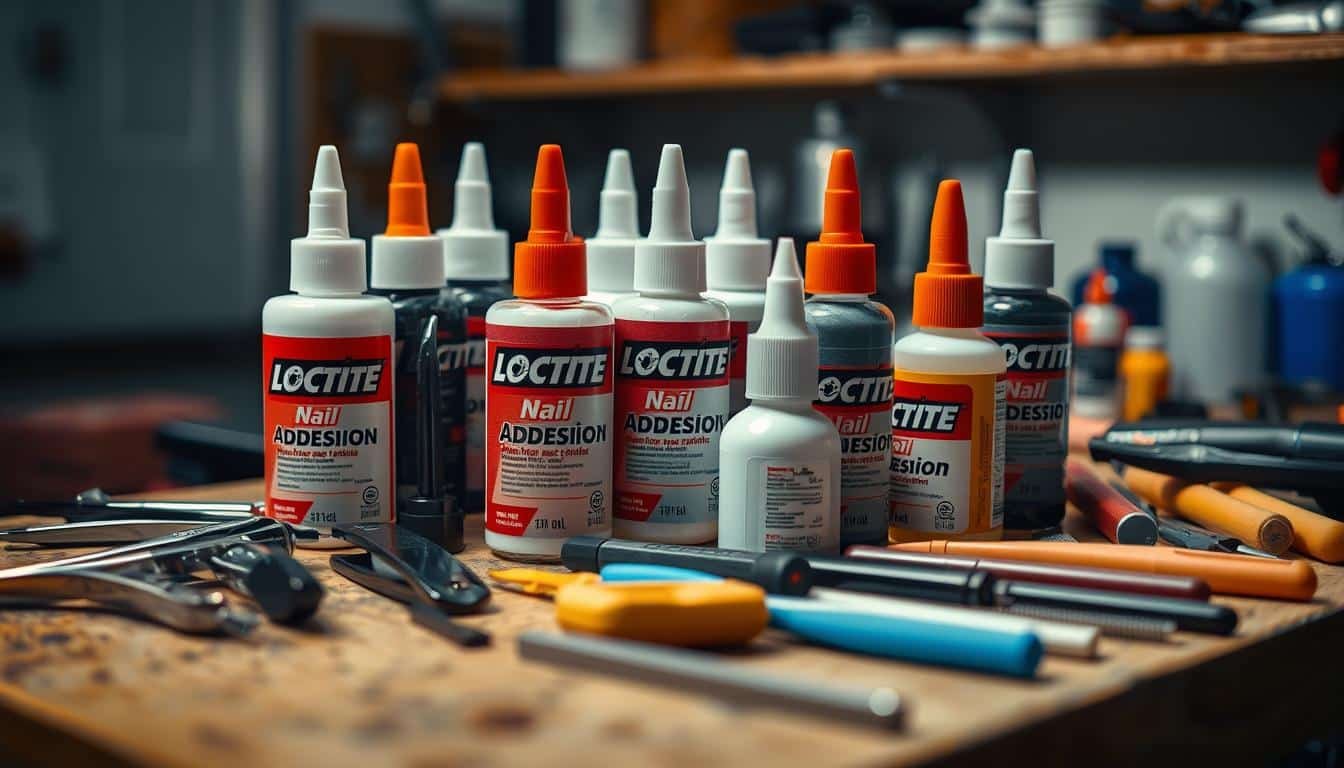Ever thought about using Loctite to fix a broken nail? It seems like a quick fix, but is it safe? This question often comes up when you need a fast solution for a nail problem. Let’s explore the world of adhesives and nail care to find out if Loctite is right for nails.
Loctite is great for bonding materials, but it’s not the best for nails. You might be tempted to use it, but it’s important to know the risks. There are safer options like nail glue and special nail repair kits that won’t harm your nails.
Key Takeaways
- Loctite is not recommended for use on natural nails
- Nail-specific adhesives are safer alternatives for nail repair
- Using industrial adhesives on nails can lead to damage and health risks
- Proper nail care products are designed to be safe and effective
- Understanding adhesive properties is crucial for nail health and safety
Understanding Loctite and Its Properties
Loctite is a top name in adhesives, famous for its strong bonds. It’s not usually for nails, but knowing about it helps us understand adhesives better.
What is Loctite?
Loctite is a flexible adhesive for both work and home. It’s known for making strong, lasting bonds on many materials. It’s made for a wide range of uses, not just nails.
Common Uses of Loctite
Loctite is used in many areas:
- Automotive repairs
- Machinery maintenance
- Home DIY projects
- Electronics assembly
Chemical Composition and Properties
Loctite’s mix of chemicals makes it work well:
| Component | Function |
|---|---|
| Methacrylate esters | Primary bonding agent |
| Polyethylene glycol | Improves flexibility |
| Silica | Enhances strength |
Loctite works without oxygen, making it strong in tight spots. This is great for many uses, but not for nails.
Can You Use Loctite on Nails?

Using Loctite on nails is not a good idea for fixing broken nails. Loctite is strong but made for fixing things, not for use on nails. It’s not safe for cosmetic use or direct application to human nails.
Loctite’s strong bonding can be harmful when used on nails. Its chemicals are not safe for skin or nails, which could cause bad reactions. It’s important to choose nail adhesives that are safe for use on nails.
If you have broken nails, use adhesives made for nails. These are safe and work well on human nails. Industrial-strength adhesives like Loctite are not the right choice.
| Adhesive Type | Suitable for Nails | Safety Level |
|---|---|---|
| Loctite | No | Low |
| Nail-specific Adhesives | Yes | High |
| Nail Glue | Yes | High |
Good nail care and the right products are essential for healthy nails. If you’re not sure about nail adhesives, talk to a professional manicurist or dermatologist. They can help find safe and effective solutions.
Alternatives to Loctite for Nail Applications
There are many options for diy nail repairs, not just Loctite. Let’s look at some safer and better choices for your nails.
Nail-specific adhesives
Nail glue is made just for nails, natural or fake. It’s gentler, so your nails and skin won’t get hurt. You can find it at beauty stores or online.
Superglue as a temporary solution
Superglue can fix nails fast in an emergency. Just a little on the broken nail and press it. But, it’s only a quick fix and should be replaced soon.
Nail polish as a witness marker
Nail polish is more than just pretty. It can mark if something is loose. This trick works at home for your nail repairs.
| Alternative | Pros | Cons |
|---|---|---|
| Nail glue | Safe for nails, easy to use | May not be as strong as industrial adhesives |
| Superglue | Quick fix, readily available | Can damage nails if used long-term |
| Nail polish | Decorative, can act as a marker | Not an adhesive, limited repair capabilities |
For nail adhesives, choose products made for beauty. They’re safer and work better for your nail care.
Risks and Considerations When Using Adhesives on Nails
It’s important to know the dangers of nail adhesives. The wrong products can cause big problems. Here are some risks to think about for your DIY nail fixes.
Potential Allergic Reactions
Some adhesives might not be good for your skin. They can cause allergic reactions like redness and itching. In severe cases, you could become allergic to these substances forever.
Nail Damage and Chemical Burns
Strong adhesives can hurt your nails and skin. They might make your nails harden or damage the nail bed. Chemical burns are also a risk, especially with certain adhesives. Always put your nail health first.
Difficulty in Removal
Removing non-cosmetic glues can be hard. It might damage your nails more. For safe DIY fixes, use cosmetic-grade products. If unsure, get help from a professional to protect your nails.








Interesting read, but really, whos gonna risk their cuticles with Loctite? Isnt that a bit extreme for nail care? Just a thought…
Interesting read, but isnt Loctite a bit extreme for nails? Ever heard of nail glue? Or is this a new trend now?
I get the Loctite points but isnt using it on nails a bit extreme? I mean, what about regular nail glue?
Extreme? Maybe. But nothing beats Loctites hold. Regular nail glue doesnt compare.
Cant we just stick to traditional nail glue? Im all for innovation but using Loctite on nails sounds risky. Just my 2 cents!
Ever thought about the toxic chemicals in traditional nail glue? Risk lies on both sides.